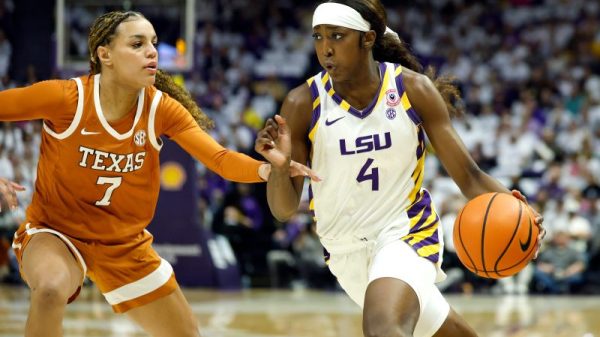Political actors, too, are always fighting the last war.
In 2020, Democrats were spooked by the idea of a repeat of 2016, fielding a candidate who’d get outmaneuvered in the Rust Belt and giving Donald Trump an electoral college victory. Joe Biden is president today in large part because a lot of Democrats saw in him the qualities they wanted: fine politically and viable electorally.
In 2024, Republicans are having similar impulses — at least, Republicans who are worried that a third straight Trump nomination will lead to a fourth straight underperformance in November. They look at 2016 and see Trump’s ascent facilitated by a too-big field and too-timid candidates positioning themselves for when he falters.
So this time the hope was that things would be different. Coalesce early around an alternative without Trump’s baggage but with strong appeal with Trump’s base. And there was just such a guy sitting around: Florida Gov. Ron DeSantis.
There’s just one problem: 2024 is not 2016. And even before DeSantis formally declares his candidacy, it’s increasingly uncertain whether he — or anyone — can effectively derail Trump next spring.
Each of the last three contested Republican primaries looked quite different than the current one. On each graph below, the darkest, red line indicates the party’s eventual nominee. The vertical dotted line marks where we are now relative to the 2024 Iowa caucuses.
Perhaps the closest analog was 2008, when former New York mayor (and future Trump sidekick) Rudy Giuliani had a robust primary lead over Sen. John McCain (R-Ariz.) at the same point in RealClearPolitics’s polling average. Like Trump, Giuliani had been gaining ground and, like DeSantis, McCain had been slipping. By the time of the Iowa caucuses, though, the race was very muddy.
In 2012 and 2016, that was the state of the contest much earlier. There were front-runners, 2008 also-ran Mitt Romney in 2012 and former Florida governor Jeb Bush or then-Wisconsin Gov. Scott Walker in 2016. None, though, was averaging above 20 percent in the polls, and each was facing a crowded field.
Notice, too, that while there were lots of surges among ultimately unsuccessful candidates, that generally only happened once. (Former House speaker Newt Gingrich is an exception; he saw two surges in 2012, not that it did him any good.) Candidates entered the spotlight and then left.
Trump, meanwhile, is cruising near 50 percent, above where he was even at the tail-end of the 2016 contest, above where anyone was in the polling averages since 2008. His popularity rose despite — if not because of — his indictment by a Manhattan grand jury on felony charges that he falsified business records. He has pleaded not guilty.
If we assume that 2024 looks the most like 2008, we should ask why Giuliani ultimately stumbled. A post-mortem at the New York Times in the wake of his loss offers one explanation: Republicans knew him as the Sept. 11 mayor and not much more. His relatively liberal positions held up poorly once voters started paying more attention.
Trump has no such problem. There is perhaps no Republican politician in recent American history as well-known by Republican voters. It would be nearly impossible for Trump to surprise his base at this point, and, even if he did, whatever that surprise might be would probably be quickly embraced by his fans.
The sample size here is small, so it’s premature to assume that Trump is on an unalterable glide. But losing does mean that someone has to win … and it seems increasingly unlikely that that someone will be Ron DeSantis.
DeSantis earned his position as Trump’s primary challenger through a happy confluence of factors. He won his reelection bid by a wide margin over a weak Democratic opponent — an opponent who used to be a Republican Florida governor. For all of the celebration of DeSantis’s victory, though, it’s worth noting that Sen. Marco Rubio (R-Fla.) won his reelection by nearly as much.
Perhaps more important, DeSantis soon became the guy anointed as the Trump-derailer. Trump-skeptical Republicans and media outlets put DeSantis forward as a viable alternative, leveraging Trump’s obvious role in dampening his party’s success in 2022. Fox News gave the governor a ton of runway.
But Trump hasn’t waited for DeSantis to get in the race. Trump has been bashing him for months now, helping define the still poorly-known governor — including by positioning DeSantis as the establishment force beholden to people like former House speaker Paul D. Ryan (R-Wis.) (boooo, say Trump Republicans) and positioning himself as the true outsider. Him, the former president! But that’s how he clambered past Bush and Walker in 2016, and it’s how he’s retaining his lead now.
Trump is doing this from a position of electoral strength. He has a big, loyal base oriented around him. That has helped him scoop up endorsements from Republicans in Congress, something that didn’t happen until late in the 2016 cycle. DeSantis’s trip to D.C. this week got him face time with lots of members of Congress … but Trump announced more new endorsements.
“Several [attendees] tried to downplay their attendance” at a private DeSantis event, Politico reported, “saying they went because the governor was a former colleague and they wanted to say hello.”
Why? Because Trump has that big base of Republican voters and has shown repeatedly that he will tell his base just how horrible that even members of his own party — of his own administration! — truly are. So why go out on a limb now for the undeclared guy who’s in second place?
That’s particularly a given because of a key reason DeSantis is in second. Much of DeSantis’s base, it’s safe to assume, is oriented less on him than on his not being Trump. And the challenge is that there are about 330 million Americans who are also not Donald Trump. If the Trump-hostile power center in the GOP decides that someone else is a better bet for taking him out, DeSantis’s descent could be much faster than his rise.
Things change. DeSantis hasn’t announced his candidacy and could find his footing. Maybe he can give as good as he gets; maybe anti-Trump Republicans will, this time, coalesce around a non-Trump early, loyally and fervently. Maybe it will be him.
The fundamental problem, though, is that Trump will always be able to provide something to Republican voters that no one else can: a willingness to burn it all down.
DeSantis was a standard-issue Paul-Ryan Republican when he was in the House. Trump was never on that path. He’s held one office, a powerful one in which consensus-building was an occasional endeavor, not a constant one. Republicans have been told for well over a decade that the establishment and Washington are corrupt. Trump demonstrated that, as president, he was willing to throw everything except the perks into the fire.
Maybe if Trump-skeptical Republicans had found a DeSantis-like candidate in July 2015 and coalesced around him at that point, the past eight years would have been different. It’s not clear that a similar strategy can work now against a more-established and more powerful Trump.
It’s not clear what strategy could.



























